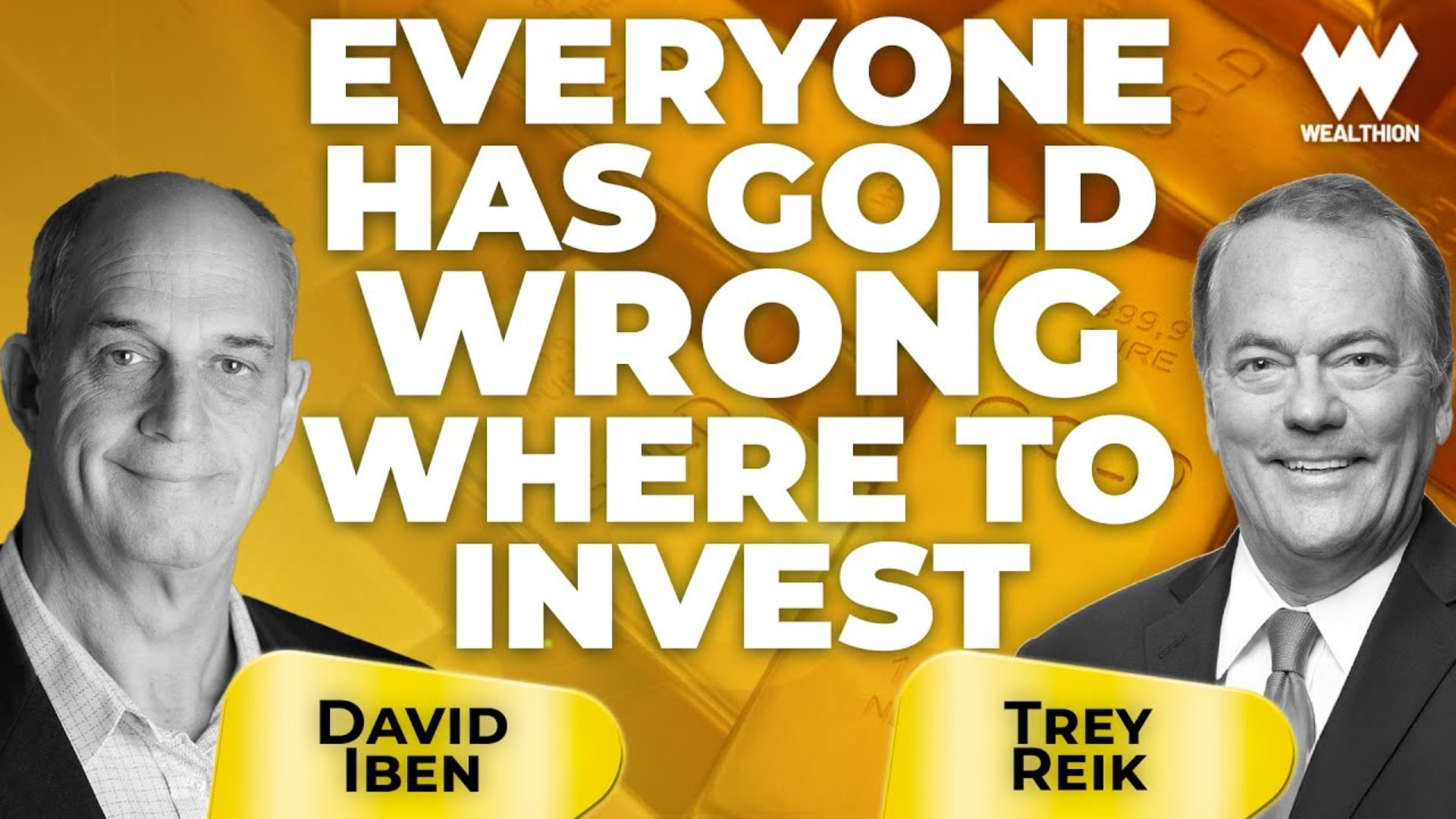As we wrap up the year and celebrate the festive season, we wanted to share some of our favorite moments from one of your favorite Wealthion interviews from 2024: Jonathan Wellum with James Connor. Enjoy!
All the best for a happy, healthy, and prosperous New Year!
Investment Concerns? Get a free portfolio review with Wealthion’s endorsed financial advisors at https://bit.ly/3W0fMxJ
Original interview, aired Oct 16, 2024: https://youtu.be/I_HCntZkBWY
Andrew Brill 0:00
Happy Holidays from all of us here at wealthion to all of you, I’m one of your hosts here at wealthion. Andrew brill, we took a look back at this year, and hope you enjoy these favorite guest moments from one of our best interviews of 2024
James Connor 0:18
So Jonathan, even though you’re based in Toronto. Much of your portfolio is comprised of us names, so you’re well acquainted with the US markets. What’s your take on the US economy right now? Do you have any concerns?
Jonathan Wellum 0:30
Well, this the concerns that we’ve talked about even you know in the past. First of all, the economy is chugging along. It’s it’s amazingly resilient. It’s probably one of the most resilient economies in the world, and that’s testimony to very dynamic market, and certainly a dynamic economy and dynamic investors down there. Also, I think it’s indicative of a lot of deficit spending. And so as we know, the government is spending on about 6% of GDP or more in terms of its deficit. So debt continues to go up, but overall it’s been very resilient. It’s not growing quickly, as we know the numbers, and there’s been lots of adjustments to the to the employment numbers and so forth, but it has been chugging along, plodding along better than, certainly the European economies, better than the Canadian economy, and as we know, China also, although they’re doing a lot of stimulus. So overall, not too bad for the US, but we have the same concerns, a lot of deficit, you know, deficit spending, massive debt. Where does all this go? These are all structural. It’s going to be very difficult to get out of that situation. And they’re going to have to, you know, more and more pressure to continue lowering interest rates in order to get the interest cost down and to keep the economy above above water.
James Connor 1:42
So, and I’m glad you brought up TD Bank. I was going to ask you about that, and so just to lay the groundwork for our viewers, TD Bank got hit last week on the back of an official ruling out of the SEC. The fine was over $3 billion number of restrictions on terms of future growth in the US, and that’s what was driving the growth at TD Bank, and now it’s probably the worst performing bank in North America. It’s down 8% on the year. So would you not revisit it, given the evaluations, or do you think it’s there’s more to come on the downside? Yeah, it’s
Jonathan Wellum 2:15
good question. And so no, we will revisit it. We’ll it won’t be for a few more months, we’ll let things just settle out, because our overall view in the banks is is neutral at best, and so we’re not enthusiastic about it. We’re looking at other spaces, but it is setting up for a perfect opportunity to buy a very well run bank. I mean, obviously they made a major mistake in a couple of the segments in the US. And unfortunately, that can happen with collusion amongst a number of employees, and it was serious. And as we know, if you get into trouble in the States, they’ll take you out to the woodshed and really beat you up and extract as much money out of you as possible. But the bigger issue for TD Bank is that they are now limited in growth. You know, they’ve been slapped and so from a regulatory point of view. They really can’t grow the business in the states now for a couple of years, and that is probably the biggest impact in terms of valuation of the bank, because Canada is already super saturated. As you know, it’s already an oligopolistic situation up here. So it’s it’s really not a lot of growth in the Canadian marketplace, and everybody’s up to their eyeballs and debt anyway in Canada. So expanding your balance sheets in Canada is going to be a trickier business. So that’s, that’s something, though, that we will be definitely looking at. And there could be a great entry point and opportunity when this thing, when all the dust settles, and that shouldn’t be too far out, and certainly banks learn from their mistakes, and we’ll, we’ll see about that. That could be a great opportunity. Yeah, I
James Connor 3:42
recently spoke with another fellow Canadian, David Rosenberg, and his big concern is one of complacency, and he’s also concerned that many people are too overexposed to equities, especially baby boomers. And he’s made mention of the fact that no one does research anymore. They just buy right? And are you concerned that there’s this level of complacency out there, and regardless of what’s happening in China, China’s maybe imploding regardless of the hostilities in the Middle East, regardless of what’s happening in the US, or in this upcoming election, the the S, P and the Nasdaq just keep going higher every day. Do you are you concerned at all but this level of complacency that’s out there? Yeah,
Jonathan Wellum 4:21
no. I mean, David Rosenberg, I think is an excellent analyst. I followed him from his Merrill Lynch days and and keep, keep up with what he is saying. He’s is a, he’s a very, you know, prudent individual. He’s very numbers oriented. He gets right into the nitty gritty. And I like that. And he’s, he’s prepared to take a contrary position, which I love. And so I do think that he is exactly right. People are complacent, and that’s largely because, with interest rates being so low, up until more recently, you had to sort of look for a dividend. You had to look for that return. You weren’t getting it on cash. And so people did go into the market, and we’ve now had. I mean, other than the COVID situation, where the price, you know, the stock markets, dropped for a couple of months, but not for very long. We really haven’t had a down market in any substantial way since 2010 so, you know, you’ve got 1415, years of a bias to the upside, and there’s no question. Then you get complacency into, you know, being priced in. And so people just start to expect that they’re going to get 10% rates of return, 15% rates of return, year after year. But as I think David Rosenberg also points out, you’ve got this massive aging of the population, and you’re going to have more and more people living off of some of their investments. And so if they are heavily weighted in equities, and there’s anything that happens to the equity markets, they could they come off a little bit. You could get a knee jerk reaction, more of a knee jerk reaction, because of the allocation to equities is so high that people could come out, and that could certainly cause a larger down, down draft in equities. So no, I think people need to be careful, and there is a certain degree of complacency. The way we try to get around that is we do own what we hope to be assets that can go up when the market goes down. And so, you know, we have a little bit more in precious metals, certainly a lot more than the average investment advisor or the average Canadian is we would be running, you know, high teens, maybe, maybe 18% of our assets are more exposed to precious metals. And some of the commodities, which we think would be somewhat of a hedge over time to a week to a week stock market. So yeah,
James Connor 6:27
and I want to spend a couple of minutes on your investment style at Rock link and how it compares to that with Warren Buffett, and maybe you can just tell us about it. And what’s your investment style. Well, we
Jonathan Wellum 6:40
try to use many of the same principles that Warren Buffett utilizes, and that is, that, do we try to look at companies with with moats, good protection around them, predictable businesses with a track record that is, is excellent in fairly you know, strong long term growth industries try to buy companies again that really do produce free cash flow and are good investors in terms of investing back in their business. So they, you know, they have their own built in, you know, hurdle rates and things like that. So you can get this natural compounding and so, you know, we try to utilize, you know, strong balance sheets, very defensive businesses, but can grow, grow quickly. So, you know, we that’s where we try to utilize a similar type of investment philosophy. We’re not looking at speculative stocks. We’re not looking at junior securities. We’re not looking at stocks that have, you know, great idea and sound it might turn out well, but they’ve already proven, and by their track record, that they know how to make money, and they have a cash flow that’s coming out of them that we can value, and we don’t have to be, you know, making wild assumptions in order to justify the valuation of those businesses. So some of our top holdings would include business that are in the technology space. So we would have, you know, some of the rover technologies, which is that, you know, major software kind of company, but a lot of industrial software, so it’s a leader in a number of different industry verticals. We love that type of business. As you know, software business a great cash flow business reoccurring. You get embedded in people’s businesses. You have higher retention rates things like that. Buffett, of course, does not invest in precious metals. And so we would differ with them there. But when we go into the space, we try to go through royalty companies, so they’re really investment bankers to the mining businesses. And we like that, because they do create a cash flow stream that you can value, and you can look at the counterparty risk in countries that they’re in, and, you know, build up a comfort zone with the risk profile, things like that. And, you know, we own some consumer, you know, consumer staple businesses, which, of course, Buffett likes companies like church and Dwight. We’ve gone nestle in the past. We’ve We’ve lightened up our position there more recently. And in Financials, you know, financials, even though we don’t own some of the banks, we also certainly will invest in other financials, like the like the Brookfield companies, which are, you know, infrastructure, but also financial companies, and, you know, Burford capital, which provides litigation, finance, things like that. So in all the companies that we’re looking at, do they have a long standing business? Are they run by sharp people? They know how to allocate capital. They’re generating free cash flow. We can value them in the marketplace and justify what we’re paying for them today, and the future looks pretty bright for them in terms of the industry dynamics and growth opportunities.
James Connor 9:29
You mentioned royalty companies. So what royalty companies do you currently own? We
Jonathan Wellum 9:33
do have exposure to, you know, the big the big ones, you know, Franco, Nevada, and we’ve actually started adding a little bit more to it once it got sort of knocked down a little bit because of the trial and tribulation there in in Panama, with the Cobra mine, where they they had the copper mine shut down. But we do want some Franco Nevada and wheat and precious metals has been a very, very large holding for us for some time, and Randy small where. Or runs a, you know, a really beautiful business. There are lots of lots of growth and good capital allocator and, oh, Cisco royalties. And we also have some sandstorm, which is a very strong company with their profile, they have a doubling, it looks certainly built into their business, a doubling of revenue over the next five years. And I think Nolan Watson’s position that company very well. Even if the price of gold goes sideways, you’re going to get a lot of growth in that business over the next few years. So those are some of the, some of the major royalty positions that we
James Connor 10:29
have. And how many names would you have in your portfolio?
Jonathan Wellum 10:31
We like to focus. I mean, one of the things that from our perspective, is people often deworcify, to use Peter Lynch’s old expression. I think he had that in one up and one Wall Street. But fantastic book he wrote back in the late 80s, early 90s, and so you can be in too many places. That’s why we don’t we’re not big ETF guys and index investing. So we typically have 20 to 25 stocks with our top five or six companies being, you know, 35 to 40% of the portfolio. So for us, it’s all about knowing the companies, researching them, and then having a heavier focus on the companies that we really like, that we think are well positioned and can grow very quickly over the next little while. And we think that’s the way that you can outperform and also manage risk, because you understand the businesses really well. Thanks
Andrew Brill 11:21
again for watching these favorite moments of 2024 and we hope we can continue to provide you with information that will help you invest wisely and be financially resilient. Wishing all of you a healthy, happy, safe and prosperous 2025.




